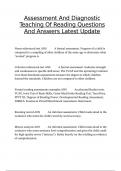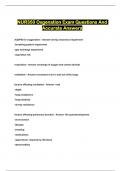Assessment And Diagnostic
Teaching Of Reading Questions
And Answers Latest Update
Norm-referenced test ANS✔✔ A formal assessment. Progress of a child is
compared to a sampling of other children of the same age to determine what
"normal" progress is.
Criterion-referenced test ANS✔✔ A formal assessment. Indicates strength
and weaknesses in specific skill areas. The TCAP and the upcoming Common
Core State Standards assessments measure the degree to which children
learned the standards. Children are not compared to other children.
Formal reading assessments examples ANS✔✔ Accelerated Reader tests,
TCAP, Iowa Test of Basic Skills, Gates-MacGinitie Reading Test, TerraNova,
PPVT III, Degrees of Reading Power, Developmental Reading Assessment,
DIBELS, Fountas & Pinnell Benchmark Assessment Instrument
Running record ANS✔✔ An informal assessment. Child reads aloud to the
evaluator who notes the child's word-by-word accuracy.
Miscue analysis ANS✔✔ An informal assessment. Child reads aloud to the
evaluator who notes sentence level comprehension and gives the child credit
for high-quality errors ("miscues"). Relies heavily on the retelling as evidence
of comprehension.
, Observational/anecdotal records ANS✔✔ An informal assessment. The
teacher observes the child and notes his/her progress in word recognition,
strategies for addressing unknown words, use of letter- sound relationships,
use of word order (syntax), use of semantics (meaning), fluency, use of
comprehension strategies, reading attitudes and behaviors, etc.
Observational checklists ANS✔✔ An informal assessment. The teacher
indicates on a checklist on a weekly/biweekly/monthly basis information
about the child: choices about reading, ability to sustain reading, explores a
variety of genres, uses reading strategies like summarizing and connecting,
uses prior knowledge, uses visual information, uses decoding and other
strategies with unknown words, adjusts reading rate, etc.
Work samples ANS✔✔ An informal assessment. The teacher collects the
student's written responses to reading, audiotaped readings, audiotaped
retellings, writing about reading, etc., to note progress on a weekly or monthly
basis.
Informal reading inventory (IRI) ANS✔✔ An informal assessment. The
teacher has the student read a piece of text provided in the inventory, asks a
series of questions about the reading, and determines comprehension based on
the number of comprehension questions answered correctly.
Portfolios ANS✔✔ Children keep their work over a grading period, semester,
and/or year, then organize their work in "scrapbook" fashion, reflecting on and
writing about their group from one time period to the next. Portfolios involve
self-assessment, as the children chart through authentic evidence their
strengths and continuing challenges.
Informal assessment examples ANS✔✔ • Retellings





